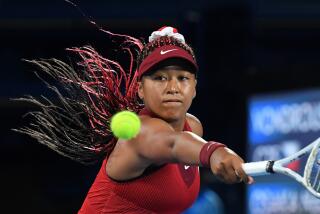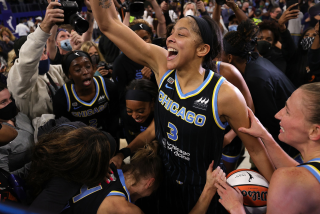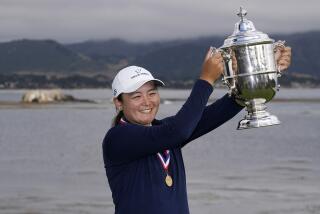25 and Recounting
- Share via
PARIS — Jennifer Capriati put her life back together again, and having succeeded, turned her attention back to tennis. For the second time, she tried to get Harold Solomon to work with her and succeeded.
He asked her about her aspirations. At the time, in early 1999, she had been unable to advance past the second round of a Grand Slam.
“She said, ‘If I could ever ever get anywhere near the top 20, I’d be the happiest girl of all time,’ ” Solomon recalled.
Of course, she long ago realized that happiness isn’t linked to rankings. If that were true, Capriati would lead a perfect life, having climbed from No. 101 at the end of 1998 to her current No. 4, trailing only Martina Hingis, Venus Williams and Lindsay Davenport.
Her victory at the Australian Open in January was probably the most popular Grand Slam championship title since Monica Seles at the Australian Open in 1996 (coming three years after her stabbing).
Now, the fourth-seeded Capriati is three matches from completing the second leg of the Grand Slam, the French Open. In the fourth round Sunday, she defeated No. 16 Meghann Shaughnessy, 7-5, 6-1, losing just one of the final nine games. Tuesday, in the quarterfinals, Capriati plays No. 6 Serena Williams. Williams defeated Nadia Petrova of Russia, 6-3, 6-1.
The script, as far as Capriati is concerned, is already in decent shape, no matter what happens against Williams or anyone else.
“A good story? I don’t know. Find my Prince Charming,” she said, smiling. “It already is a good story. I feel well. I’m playing great so far. We’ll see what happens. It’s good no matter what.”
Finding Prince Charming may have been on her mind because her former boyfriend, Xavier Malisse, of Belgium has been strolling the grounds and hanging out with his new girlfriend at Roland Garros. The breakup wasn’t easy, but Capriati’s game took off after they parted ways. She started working harder and became fitter with the help of two trainers and her father, Stefano, who is her coach.
If winning is the best revenge, Capriati took it one step beyond, by looking good at the Laureus, the world sporting awards, last month in Monte Carlo and she did meet a Prince, Prince Albert of Monaco. She received a comeback award and unveiled a Valentino evening dress.
“I looked at the price and said, ‘Oh no.’ It was pretty expensive,” Capriati said. “They gave me a discount. It’s more than you can imagine, that a dress could be like that. That was the whole fun part, going around looking for the dress. We made a whole day of it, trying on the shoes and getting made up.
“It’s my style. A few years ago, maybe I would have been too young. Now, I think it was perfect. It was enough. A young-looking dress but not too much.”
Navigating the stairs to receive her award was an adventure. Olympic sprinter Cathy Freeman of Australia nearly did a pratfall off the steps.
“It was so scary,” Capriati said. “She’s such a great athlete, she caught herself, Thank God. The steps were bad. She almost fell in Prince Albert’s lap.”
Capriati was sitting in a small interview room at Roland Garros after one of her early-round matches last week, laughing about The Dress and The Prince. She doesn’t like doing interviews during Grand Slam events, but part of her is willing to please and she is invariably polite, so polite she doesn’t make fun of a clumsy journalist when given an ideal opportunity.
Her supreme confidence is limited to the court. Said Mirjana Lucic, who won only four games against Capriati in the third round: “She can go as far as she wants. I would say she’s pretty much the favorite.”
That role is new, and Capriati is working on the fit. “I’m confident going out there, definitely not cocky,” she said. “Before I would have such a lack of confidence that I would just almost be afraid on the court, get nervous, feel like I didn’t even belong there.”
The bring-it-on aura came after the Australian Open when, in succession, Capriati beat Seles, Davenport and Hingis. Since then, she won the Family Circle Cup on clay, defeating Switzerland’s Hingis. She lost the Miami final to Venus Williams after holding eight match points and reached the final at the German Open, falling to France’s Amelie Mauresmo.
“I feel like I’ve established a presence,” she said. “It also helps, the winning too, maybe the other players feel intimidated. But it can work the other way. They want to beat you so bad.”
Said Solomon, who has remained on good terms with Capriati since she replaced him after the 2000 Australian Open: “I sent her an e-mail the other day telling her how proud I am of her. . . . To win the Australian Open was a great effort, and it hasn’t stopped since. The great thing to me is to see she’s built on it. Not just gone on, had one big tournament and had a fall back.”
The 25-year-old Capriati was able to shake off the loss to Williams with relative equanimity. At 14, she would have been shattered for months. But right after Miami, her mother, Denise, had hip replacement surgery, and Jennifer pulled out of the Amelia Island, Fla., event to be with her. The surgery went well, enough so that Denise is in Paris and walking with the help of a cane, at times.
“That kind of took my mind off it,” Capriati said. “There’s more important stuff, really, than a tennis match.”
The private journey on a public stage took time. Capriati refers to her past troubles of teen rebellion--a brush with drugs and highly publicized arrest for shoplifting--but doesn’t get specific. Stefano was upset the topics were even mentioned, in passing, at the Australian Open.
Capriati recognizes she has come full circle. The French Open is where her star first rose, at least at a Grand Slam. Capriati reached the semifinals in her Slam debut at age 14.
Though she is often criticized for refusing to speak, frankly, about the details of her troubles, there is something to be said about relative restraint in a tell-all society. It’s a fair guess Jennifer, Stefano and Denise won’t be on Oprah soon.
“There was a time there I was depressed about things,” she said. “Everything seemed so negative, and was going against me. It depends on how you look at it. Even now, you can look at the world as being a pretty terrible place. You turn on the news and that’s all there is. It’s just your perspective.
“As soon as you realize it’s part of life, it makes it easy to cope with. It’s not all daisies here.”
More to Read
Go beyond the scoreboard
Get the latest on L.A.'s teams in the daily Sports Report newsletter.
You may occasionally receive promotional content from the Los Angeles Times.











